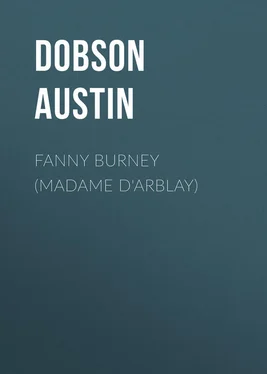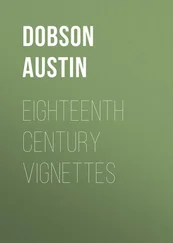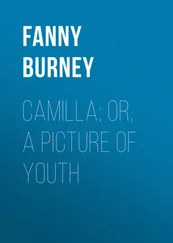Austin Dobson - Fanny Burney (Madame D'Arblay)
Здесь есть возможность читать онлайн «Austin Dobson - Fanny Burney (Madame D'Arblay)» — ознакомительный отрывок электронной книги совершенно бесплатно, а после прочтения отрывка купить полную версию. В некоторых случаях можно слушать аудио, скачать через торрент в формате fb2 и присутствует краткое содержание. Издательство: Иностранный паблик, Жанр: foreign_antique, foreign_prose, на английском языке. Описание произведения, (предисловие) а так же отзывы посетителей доступны на портале библиотеки ЛибКат.
- Название:Fanny Burney (Madame D'Arblay)
- Автор:
- Издательство:Иностранный паблик
- Жанр:
- Год:неизвестен
- ISBN:нет данных
- Рейтинг книги:5 / 5. Голосов: 1
-
Избранное:Добавить в избранное
- Отзывы:
-
Ваша оценка:
- 100
- 1
- 2
- 3
- 4
- 5
Fanny Burney (Madame D'Arblay): краткое содержание, описание и аннотация
Предлагаем к чтению аннотацию, описание, краткое содержание или предисловие (зависит от того, что написал сам автор книги «Fanny Burney (Madame D'Arblay)»). Если вы не нашли необходимую информацию о книге — напишите в комментариях, мы постараемся отыскать её.
Fanny Burney (Madame D'Arblay) — читать онлайн ознакомительный отрывок
Ниже представлен текст книги, разбитый по страницам. Система сохранения места последней прочитанной страницы, позволяет с удобством читать онлайн бесплатно книгу «Fanny Burney (Madame D'Arblay)», без необходимости каждый раз заново искать на чём Вы остановились. Поставьте закладку, и сможете в любой момент перейти на страницу, на которой закончили чтение.
Интервал:
Закладка:
The Müthel duet, which had been postponed for the Prince’s arrival, was then played with prodigious applause, relaxing even the “sorrowful countenance” of the Baron de Demidoff, who clapped his snuff box rapturously, calling out in broken English, “ Dis is so pretty as ever I heard in my life! ” Lord Bruce, turning to Prince Orloff, told him the performers were man and wife. His Highness seemed surprised, and walking up to Mrs. Burney, made her many compliments; and, expressing his wonder that two such executants should chance to be united, added “ Mais, qu’a produit tant d’Harmonie? ” To this Hetty, in a flutter, could find no fitter reply than “ Rien, Monseigneur, que trois enfants ,” – that being the extent of her family, – an artless and unexpected answer at which Monseigneur laughs immoderately, and, being “addicted to pleasantry,” retails freely to those about him, with many “droll comments and observations” on Mrs. Burney’s words. “When the room was a good deal thinned ” – Fanny goes on – “Mr. Harris told me he wished some of the ladies would express a desire of seeing the Empress’s picture nearer. ‘I, you know,’ said he, ‘as a man , cannot, but my old eyes can’t see it at a distance.’ ” [The truth was, Mr. Harris wished to be able to compare Orloff’s picture of Catherine II. with his son James’s (Lord Malmesbury’s) portrait of the King of Spain.] “I went up to Dr. King, and made the request to him. He hesitated some time, but afterwards hinted the demand to General Bawr, who boldly made it to the Prince. His Highness laughed, and with great good humour, desired the General to untie the picture from his neck, and present it to us; and he was very facetious upon the occasion, desiring to know if we wanted anything else? and saying that if they pleased, the ladies might strip him entirely ! Not very elegant, methinks, his pleasantry! When we got it there was hardly any looking at the Empress for the glare of the diamonds. Their size is almost incredible. One of them, I am sure, was as big as a nut-meg at least . When we were all satisfied it was returned, and the Prince most graciously made a bow to, and received a curtsie from, everyone who looked at it.” 20 20 Early Diary , 1889, ii. 121.
In the remainder of Fanny’s letters to Mr. Crisp, she gives an account of a further concert arising out of the famous duet. This time the principal guest was the Count (afterwards the Duke) de Guines, the French Ambassador, who was not only a virtuoso of the first order, but an accomplished flute-player, who had the reputation of having dared to beard that other distinguished performer on the same instrument, Frederick the Great. His Majesty had said to him impatiently and impertinently – “ Je vous prie, qu’est-ce que fait votre maître quand il ne peut pas chasser De Guisnes? ” The Count – a typical aristocrat of the pre-Revolution days – shrugged his shoulders, and made answer, “ Il est vrai, Sire, que mon maître n’a pas le bonheur de savoir jouer de la flûte ,” 21 21 Memoirs of the Margravine of Anspach , 1826, ii. 125.
a retort more dexterous than deserved, since Frederick, whom Dr. Burney had listened to at Potsdam, was not by any means a mere amateur. Lady Edgecumbe had talked so much to M. de Guines about the duet, that he expressed a great desire to hear it, and a second concert had to be arranged. The company convened on this occasion included Lord Ashburnham, “Groom of the Stole, and First Lord of the Bedchamber,” the Baron and Baroness Deiden, Lord Barrington, Lord Sandwich (“Jemmy Twitcher,” to wit), and Signor Venanzio Rauzzini, the “pius Æneas” to the Dido of Gabrielli. Rauzzini was vainly implored to indulge the company with a Rondeau de sa façon — i. e. from his own Piramo e Tisbe ; but he pleaded the professional cold. Fanny is enchanted with the young Roman’s appearance. “He looked like an angel,” she writes. “Nothing can be more beautiful than this youth. He has the complection of our Dick, – the very finest white and red I ever saw: his eyes are the sweetest in the world, at once soft and spirited: all his features are animated and charming .” “ ‘ Avez vous une Assemblée chez vous tous les Dimanches ,’ 22 22 Dr. Burney evidently had mild qualms about these Sunday concerts. When after the first occasion here referred to, Dr. King and Dr. Ogle supped at St. Martin’s Street, he said that he hoped for absolution from them if there was any crime in having music on a Sunday . To which Dr. Ogle replied discreetly that music was an excellent thing any and every day ; and Dr. King evasively – “Have we not music at church?”
cried he, to my father. ‘ Je viendrai une autre fois quand je pourrai chanter! ’ Only think how we were let down ! ‘ Une autre fois! ’ cried Hetty; ‘ Une autre fois! ’ echoed Susette; ‘ Une autre fois! ’ still more pathetically echoed your humble servant.” But he contributed his quota to the gossip about the Gabrielli; and when the oft-told story was repeated as to the extraordinary ceremonial parade she observed in quitting the Opera House on Saturdays, with first a running footman to clear the way, then her sister, then herself, then a page for her train, then another footman, and then a man out of livery to carry her lap-dog in her muff, – Rauzzini interjected, “ Et puis, une autre pour un singe, et un autre pour un perroquet! ” As to “Mrs. Gabrielle” (for so she styled herself on her Golden Square doorplate), it is manifest that her reputation for whim had created considerable prejudice against her. But in the History of Music Dr. Burney, who knew her intimately, is much milder in his expressions than the more excitable members of his family. He says that despite her low origin (she was the daughter of a Cardinal’s cook at Rome), she had extraordinary grace and dignity of gesture. She was, moreover he declared, the most intelligent and best bred virtuosa with whom he ever conversed, speaking like a well-educated woman, who had seen the world, not only on music, but on other subjects. “In youth,” he writes, “her beauty and caprice had occasioned an universal delirium among her young countrymen, and there were still remains of both sufficiently powerful, while she was in England, to render credible their former influence.”
That Fanny’s detailed despatches delighted her correspondent at Chessington, is only to be expected. “You have produc’d such an illustrious assembly of Princes, and generals, and lords, and ladies, and wits, and pictures, and diamonds, and shoulder-knots, that I feel myself shrink into nothing at the idea of them, – nay, you yourself that made one among them, seem to be a little dazzled at their glare.” And then Mr. Crisp rallies her upon her evident admiration of the “beautiful Rauzzini.” In another letter there is a significant sentence. “You have learned from that R[ ogue ] your father (by so long serving as amanuensis, I suppose) to make your descriptions alive” – an utterance which, while it throws some light on the vexed question of Miss Burney’s style, also recalls us to the progress of that History of Music , in which she bore so laborious a part. In March 1775 it had come to a “dead stop” owing to Dr. Burney’s rheumatism, which prevented him from writing; and in April it was scarcely moving. “My father’s History goes on very slowly indeed at present… He teaches from nine to nine almost every day, and has scarce time to write a page a week.” Still, it gradually progresses, and in October, Fanny is able to report that the first volume is ready. “The History has been this very day, for the first time since its long cessation, put into the press[?]. It is now rough written to the end of the first volume, Preface and Dedication inclusive. When it is actually published , we intend to keep the Carnival.” A few days before, the Dedication to the Queen had been read by Dr. Burney to an admiring friend; and in 1776 the first volume was issued, when, we may conclude, the Carnival was duly kept.
Читать дальшеИнтервал:
Закладка:
Похожие книги на «Fanny Burney (Madame D'Arblay)»
Представляем Вашему вниманию похожие книги на «Fanny Burney (Madame D'Arblay)» списком для выбора. Мы отобрали схожую по названию и смыслу литературу в надежде предоставить читателям больше вариантов отыскать новые, интересные, ещё непрочитанные произведения.
Обсуждение, отзывы о книге «Fanny Burney (Madame D'Arblay)» и просто собственные мнения читателей. Оставьте ваши комментарии, напишите, что Вы думаете о произведении, его смысле или главных героях. Укажите что конкретно понравилось, а что нет, и почему Вы так считаете.












